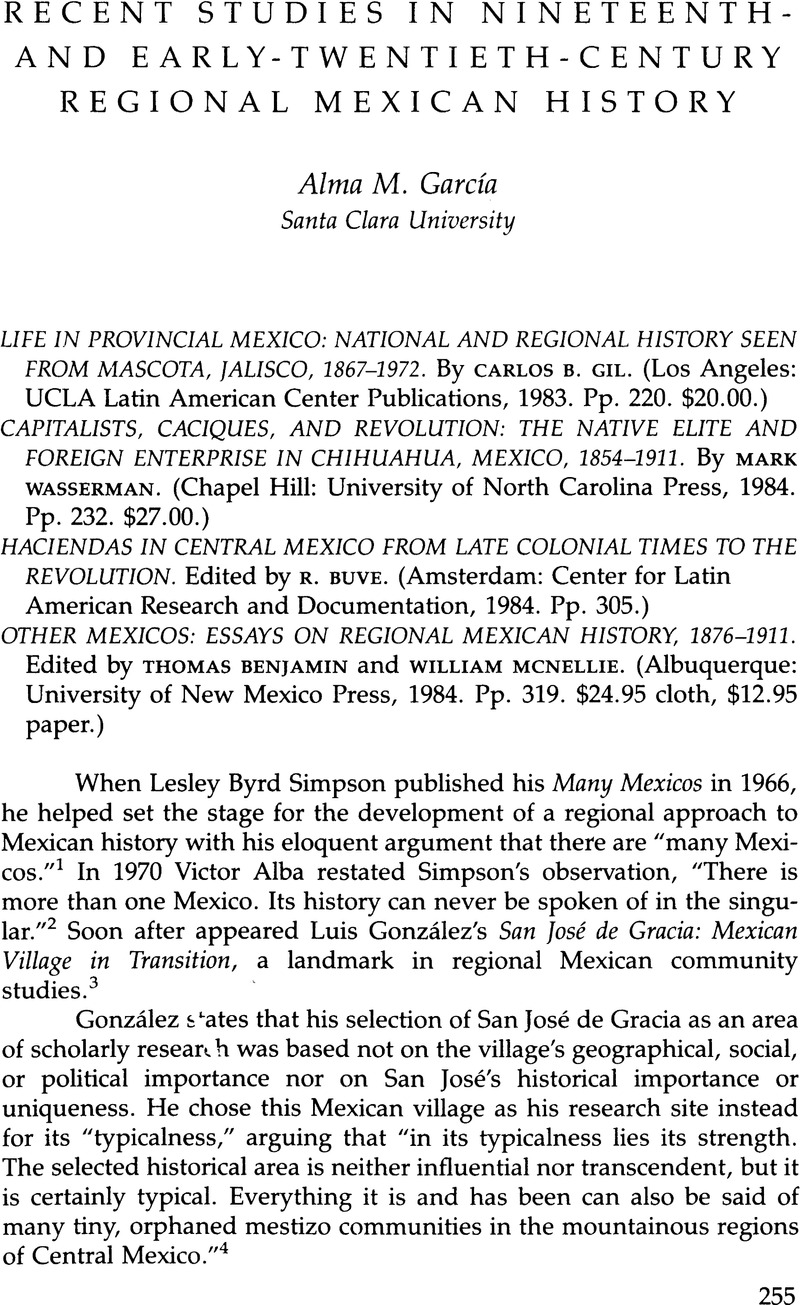Published online by Cambridge University Press: 12 October 2022

1. Lesley Byrd Simpson, Many Mexicos (Berkeley and Los Angeles: University of California Press, 1966), 10.
2. Victor Alba, The Mexicans: The Making of a Nation (New York: Pegasus, 1970), 8.
3. Luis González, San José de Gracia: Mexican Village in Transition, translated by John Upton (Austin: University of Texas Press, 1972). It was originally published under the title Pueblo in vilo: microhistoria de San José de Gracia (Mexico City: Colegio de Mexico, 1972).
4. Ibid., p. xvi.
5. Ibid.
6. Ibid., p. xxiv.
7. Joseph L. Love, “An Approach to Regionalism,” in New Approaches to Latin American History, edited by Richard Graham and Peter H. Smith (Austin: University of Texas Press, 1974), 137.
8. Barry Carr, “Recent Regional Studies of the Mexican Revolution,” LARR 15, no. 1 (1980):3.
9. Gilbert M. Joseph, Revolution from Without: Yucatán, Mexico, and the United States, 1880–1924 (Cambridge: Cambridge University Press, 1982), xi.
10. See these regional studies: Hector Aguilar Camin, “The Relevant Tradition: Sonoran Leaders in the Revolution,” in Caudillo and Peasant in the Mexican Revolution, edited by David A. Brading (Cambridge: Cambridge University Press, 1980), 92–123; Dudley Ankerson, “Saturnino Cedillo: A Traditional Caudillo in San Luis Potosí, 1890–1938,” in Caudillo and Peasant, 140–68; Raymond Buve, “State Governors and Peasant Mobilization in Tlaxcala,” in Caudillo and Peasant, 224–44; Friedrich Katz, “Pancho Villa, Peasant Movements, and Agrarian Reform in Northern Mexico,” in Caudillo and Peasant, 59–75; Raymond Buve, “Peasant Movements, Caudillos, and Land Reform during the Revolution (1910–1917) in Tlaxcala, Mexico,” Boletín de Estudios Latinoamericanos y del Caribe 18 (June 1975):112–52; and Paul Friedrich, Agrarian Revolt in a Mexican Village (Englewood Cliffs, N.J.: Prentice-Hall, 1970).
11. Joseph, Revolution from Without, xi–xii.
12. For a critical review of the modernization approach, see J. Samuel Valenzuela and Arturo Valenzuela, “Modernization and Dependency: Alternative Perspective in the Study of Latin American Underdevelopment,” Comparative Politics (July 1978):535–57. For other critiques, see: André Gunder Frank, “Sociology of Development and Underdevelopment of Sociology,” Catalyst 2 (Summer 1966):20–73; Joseph R. Gusfield, “Tradition and Modernity: Misplaced Polarities in the Study of Social Change,” American Journal of Sociology 72 (Jan. 1967):351–62; Reinhard Bendix, “Tradition and Modernity Reconsidered,” Comparative Studies in Society and History 9 (June 1967):292–346; Dean C. Tipps, “Modernization Theory and the Comparative Study of Societies: A Critical Perspective,” Comparative Studies in Society and History 15 (Mar. 1973): 199–266; and Alejandro Portes, “Modernity and Development: A Critique,” Studies in Comparative International Development 8 (Spring 1973):88–112.
13. Immanuel Wallerstein, The Modern World System: Capitalist Agriculture and the Origins of the European World-Economy in the Sixteenth Century (New York: Academic Press, 1974), 7.
14. For discussions of such revisionist literature, see Robert Brenner, “Agrarian Class Structure and Economic Development in Pre-Industrial Europe,” Past and Present 70 (Feb. 1976):30–75; and Theda Skocpol, “Wallerstein's World Capitalist System: A Theoretical and Historical Critique,” American Journal of Sociology 82 (Mar. 1977):1075–90.
15. A similar analysis using Brazil as a case study can be found in Peter Evans, Dependent Development: The Alliance of Multinational, State, and Local Capital in Brazil (Princeton, N.J.: Princeton University Press, 1979).